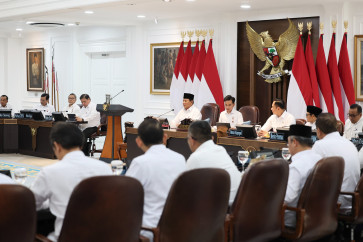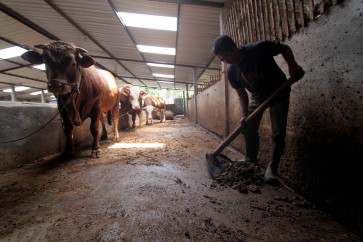Popular Reads
Top Results
Can't find what you're looking for?
View all search resultsPopular Reads
Top Results
Can't find what you're looking for?
View all search resultsGovt urged to monitor adulterated liquor
The government should monitor and curb the widespread circulation of adulterated liquor, Lifesaving Initiatives Against Methanol (LIAM) Charitable Fund Australia in Indonesia says
Change text size
Gift Premium Articles
to Anyone
T
he government should monitor and curb the widespread circulation of adulterated liquor, Lifesaving Initiatives Against Methanol (LIAM) Charitable Fund Australia in Indonesia says.
Spokesman Aji Sulaiman said the unchecked circulation of methanol was a danger to Australian tourists in Bali.
'Actually, besides Australia, four other countries have issued warnings regarding the widespread circulation of methanol in Indonesia. Despite this, the problem persists and has claimed more lives,' said Aji.
'This situation is very harmful and can tarnish the image of Indonesia in the eyes of the international community.'
He added that his group would continue to campaign on the dangers of methanol and provide training to medical workers at hospitals and community health centers (puskesmas) to deal with methanol intoxication.
The LIAM Charitable Fund was founded following the death of 19-year-old Australian Liam Davies. He died after consuming a liquor concoction during New Year's Eve celebrations in Lombok, West Nusa Tenggara (NTB) in January 2013.
Illegal spirits also killed Brit-tourist Cheznye Emmons in April 2013, after she drank Mansion House Dry Gin with her friends in Bukit Lawang, North Sumatra. She died at Columbia Asia Hospital in Medan with doctors declaring the cause of death to be due to methanol poisoning.
The National Movement on Liquor recorded that 18,000 people in Indonesia died from drinking adulterated liquor every year.
On Jan. 6, in Mojokerto, East Java, 17 people were killed after consuming adulterated liquor.
East Java Police chief spokesman Sr. Comr. Awi Setiyono said 29 people had drunk the liquor and methanol had been present in the blood of both the dead and survivors.
Awi added that police would continue to conduct operations to curb the circulation of methanol. Police have named a husband and wife suspects for concocting the fatal brew. The couple, identified as Robi Hari Kurniawan and his wife, Nuraini, violated multiple articles and could face up to 20 years in prison when proven guilty.
Sociocultural observer at Surabaya's Airlangga University Laurentius Dyson acknowledged that in a number of regions, consuming alcohol was an integral part of traditional rituals.
'For traditional communities, liquor is generally drunk during ceremonies, such as weddings and funerals. Some of them even drink to get courage to appear in front of people,' said Laurentius.
'In Kalimantan [for example] there is a tradition called nuaak, which means to get drunk. This is a fact,' emphasized Laurentius.
Surabaya Consumers Protection Institute head Paidi Pawiro Rejo said a regulation had actually been issued on the circulation of liquor, especially for products that were sold to the public.
'Adulterated liquor has never been touched by law. The relevant agencies blame each other when people die, using the excuses of lack of authority or budget,' said Paidi.
According to him, due to tradition and demand, the illegal circulation of adulterated liquor will remain rife.
'The key is law enforcement. Besides that, consumers must be smarter when choosing products that are regarded as hazardous to health,' added Paidi.










